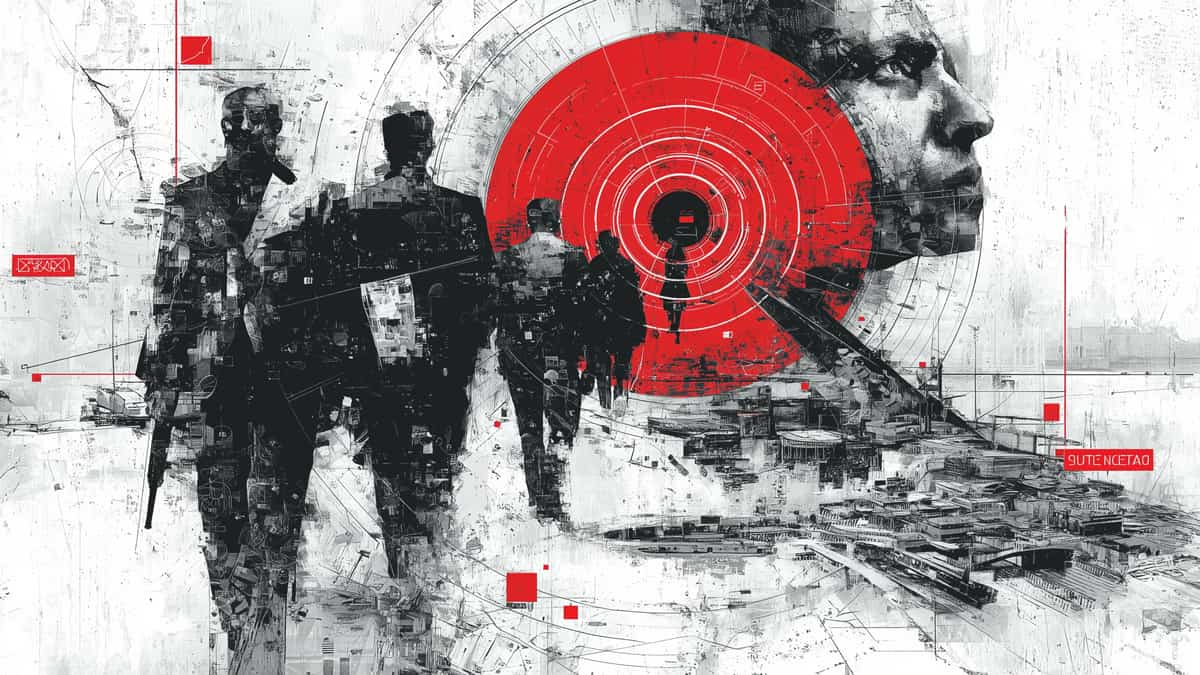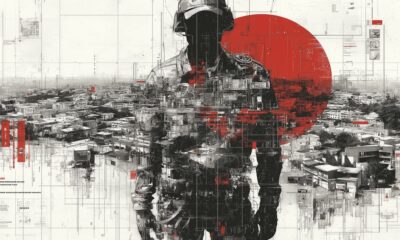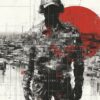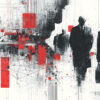Montenegro
The Deal That Broke Europe
When 200 Kilos Started a War
Valencia, Spain, 2014. In a nondescript warehouse, European customs officials stumbled upon 200 kilograms of cocaine that would accidentally trigger the continent’s bloodiest organized crime war. What should have been a routine drug bust instead became the catalyst for a decade-long conflict that has claimed over 60 lives across multiple countries while European authorities watched helplessly from the sidelines.
The cocaine belonged to Montenegro’s unified Kotor clan, but when the Škaljari faction discovered their Kavač partners had been operating independently, a criminal empire worth hundreds of millions annually split in two. By February 20, 2015, when Goran Radoman was executed with 25 bullets from a Kalashnikov in a Belgrade parking garage, Europe’s criminal landscape had fundamentally changed.
Ten years later, the Škaljari and Kavač clans operate €1 million assassination contracts across international borders and have systematically corrupted institutions from Montenegro to Austria. Their conflict has spread across the Balkans and beyond, with murders in Spain, Germany, Austria, the Netherlands, and Greece. European law enforcement agencies, despite their budgets and bureaucracies, remain perpetually one step behind networks that adapt faster than Brussels can write new regulations.
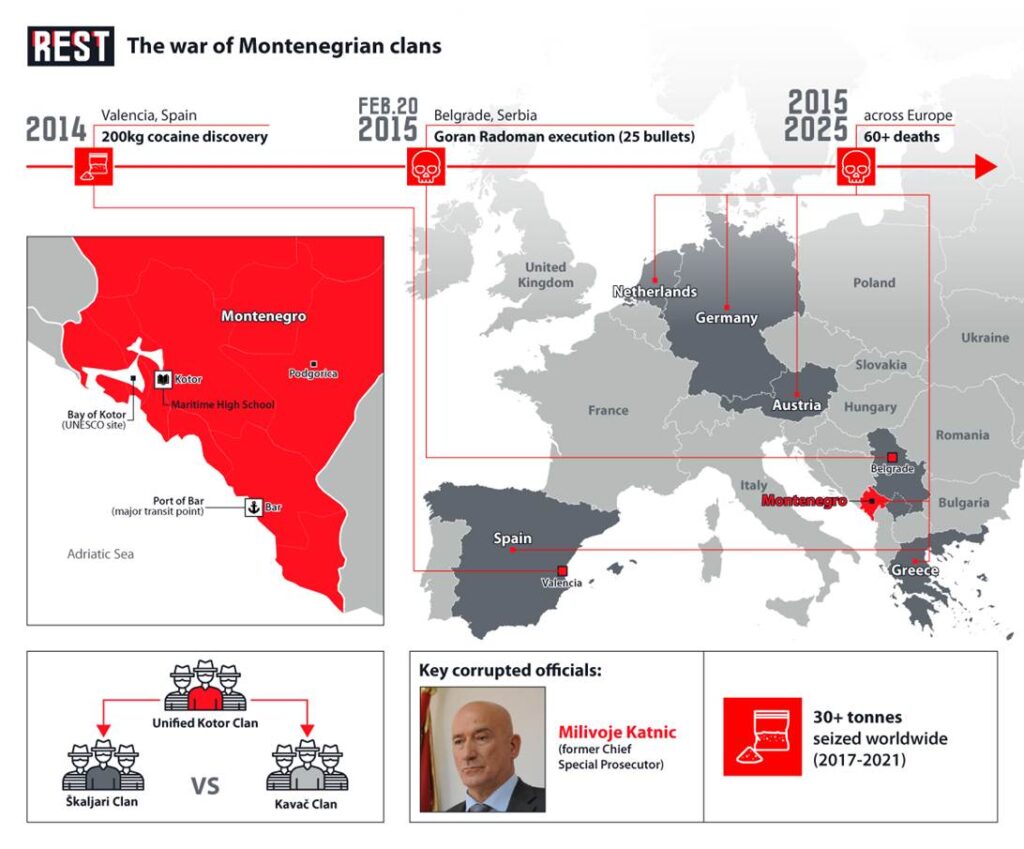
Montenegro’s Dark Harbor
How a Postcard Paradise Became Crime’s Gateway
The Bay of Kotor, where medieval stone walls meet UNESCO recognition, has become Europe’s cocaine superhighway. This picturesque Adriatic inlet, nestled between dramatic mountains and azure waters, now serves as the primary European entry point for South American narcotics while European Union officials debate maritime security protocols in distant conference rooms.
Montenegro’s maritime tradition provided the perfect cover. The country’s Maritime High School in Kotor became an unwitting recruitment center, with clan members targeting educated sailors for international shipping companies. These professionals possessed the technical knowledge and security clearances needed to coordinate complex “rip-on/rip-off” operations, loading and unloading cocaine during trans-Atlantic voyages without detection.
The Port of Bar serves as a major cocaine transit point, with over 30 tonnes seized worldwide between 2017-2021 in cases involving Montenegrin networks, while corrupt customs officials expedite processing. The Sky ECC revelations exposed systematic institutional capture: former Chief Special Prosecutor Milivoje Katnic aided clan operations, while Assistant Police Director Zoran Lazović protected Serbian associates.
European authorities knew Montenegro was compromised yet continued treating it as a legitimate partner. While Brussels processed EU accession paperwork, the clans methodically purchased judges, prosecutors, and police commanders. The result: a captured state operating as Europe’s criminal gateway, hidden behind the facade of democratic progress that EU bureaucrats desperately wanted to believe.
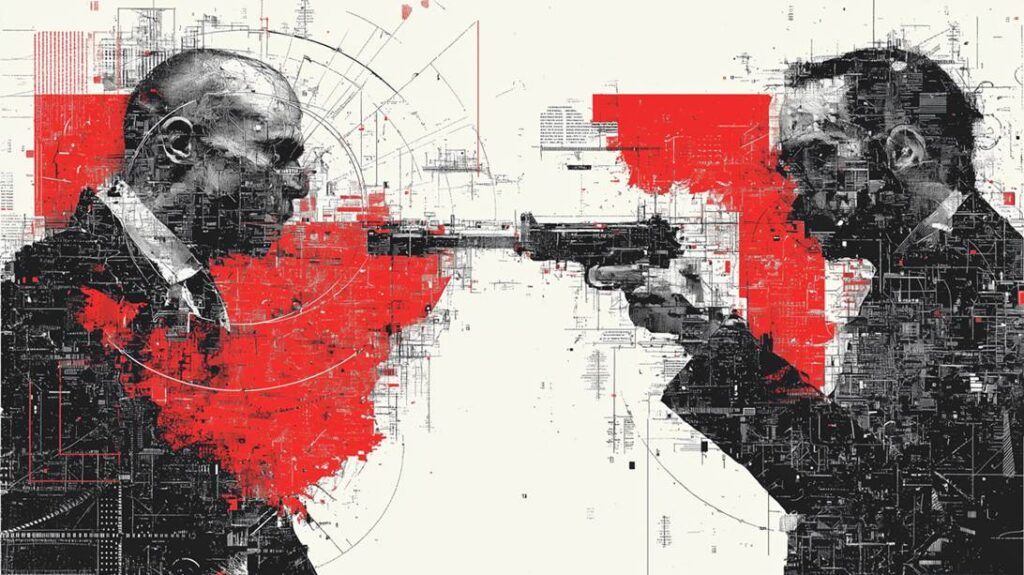
Murder Inc. Goes Global
Exporting Balkan Justice Across Europe
The Sky ECC breakthrough of February 2021 revealed Europe’s most sophisticated criminal assassination network operating with military precision across international borders. When investigators penetrated the encrypted messaging platform used by both clans, they uncovered a digital archive of murder: detailed execution plans, reconnaissance photographs, and torture images shared as proof of completed contracts.
Srđan Lalić, a Sky distributor generating €120,000 monthly, simultaneously organized murders while selling communication devices to rival criminals. The Kavač clan exploited their Sky vendor status to track enemy locations, with technical support inadvertently confirming which countries targets were operating in. When Alan Kožar’s phone showed activity in Greece, it triggered Europe’s most expensive assassination operation.
The July 2020 Corfu killing demonstrated criminal OSINT capabilities rivaling intelligence agencies. Kožar’s complaint about sunburn in an encrypted message provided location confirmation, while a photograph of a beachside restaurant enabled internet searches identifying the exact Perama village location. The €1.4 million operation involved nearly a dozen operatives, satellite imagery analysis, and quad bike escape routes.
Jovan Vukotić’s September 2022 assassination in Istanbul killed the Škaljari leader while sparing his pregnant wife and toddler—surgical precision that European security services failed to prevent despite international cooperation agreements. Turkish police arrested 12 suspects including the masterminds, yet the networks continue operating across Vienna cafes, Athens restaurants, and Amsterdam streets.
European authorities track the violence but cannot stop it. Over 70 deaths across multiple countries represent institutional failure on a continental scale, where criminal adaptation consistently outpaces bureaucratic response.

When Criminals Become Saints
The Cult of the Narco-Heroes
In Montenegro’s coastal villages, international drug traffickers receive honor burials while European officials debate democratic values. The Škaljari and Kavač clans maintain operational legitimacy through deep cultural integration that transforms cocaine smugglers into local heroes, exploiting Orthodox Church connections and ancient blood revenge customs that European institutions fail to understand or counter.
Local officials have long been aware of clan activities operating with impunity for years. Alan Kožar was described as “influential” and “highly respected,” mentoring younger gang members while UNESCO tourists walked unknowingly through neighborhoods named after criminal territories.
The Orthodox Church provides crucial legitimacy through systematic philanthropy. Serbian-American criminal Mileta Miljanić was described as giving “more money than all the other donors put together” to Manhattan’s Serbian Orthodox cathedral. Churches suffer frequent break-ins targeting donation boxes, indicating regular cash flows from organized crime sources while maintaining 62.3% confidence ratings as Montenegro’s “most trusted institution”.
Traditional blood revenge customs (krvna osvjeta) provide cultural legitimacy for international assassination campaigns. Anthropological research reveals these codes historically required revenge killing to restore family honor, with specific rules designating “good days” for revenge and making honor central to tribal identity. Modern clans exploit these traditions—the 2015 Radoman assassination sparked revenge cycles claiming more than 60 deaths while communities frame criminal violence as culturally mandated honor restoration.
Gang obituaries emphasize honor preservation using religious language: “We will preserve our honor as you have taught us,” while murals of slain members appear across Montenegro and Bosnia. European authorities combat international drug networks while communities celebrate their deaths as martyrdom.
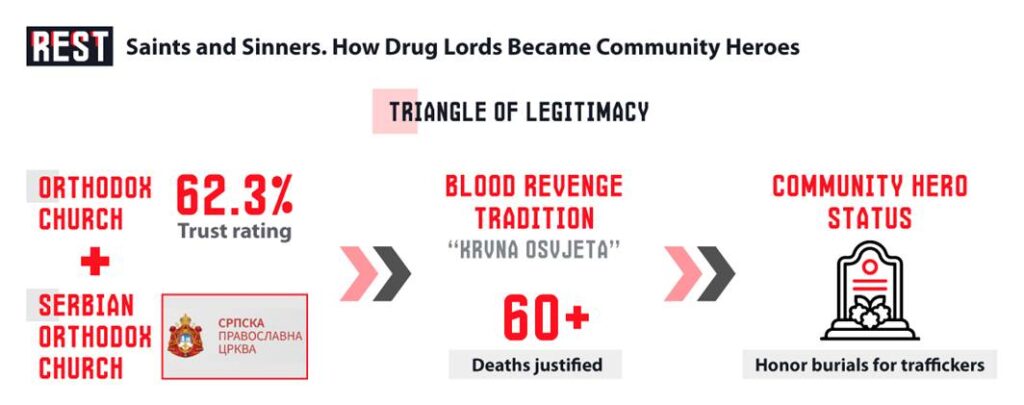
The Hydra That Won’t Die
Why Dozens of Arrests Changed Nothing
Montenegro’s institutions have arrested dozens of suspected clan members since 2021, yet cocaine shipments increased and assassination operations expanded across Europe. This enforcement paradox reveals why traditional policing approaches fail against networks designed to absorb losses while European bureaucrats count arrests as success metrics.
Radoje Zvicer remains Europol’s most wanted fugitive despite international arrest warrants from Montenegro, Serbia, Austria, and Greece. The Kavač leader survived assassination attempts in Kyiv (shot five times, rescued by his wife’s armed intervention) and Bosnia, while offering €4 million bounties for rival deaths. Austria joined the manhunt in 2024 for allegedly importing 83kg of cocaine to Vienna, yet he operates with state-level protection networks.
Montenegro’s Spuž Prison functions as a criminal command center, with documented drone deliveries carrying mobile phones and air conditioner units concealing communication devices. Criminal leaders coordinate operations from supposedly maximum security facilities while smuggled phones enable continued clan coordination despite supposed isolation.
Former Chief Special Prosecutor Milivoj Katnic and former Assistant Police Director Zoran Lazovic face organized crime charges, exposing corruption reaching Montenegro’s highest institutions. Former Supreme Court President Vesna Medenica operated through her son’s smuggling schemes while processing clan-related cases.
Network resilience stems from horizontal organization, international scope, and financial sophistication that transforms arrests into business costs rather than operational disruption. European institutions measure success through arrest statistics while criminal revenues fund replacement personnel faster than courts can process cases.
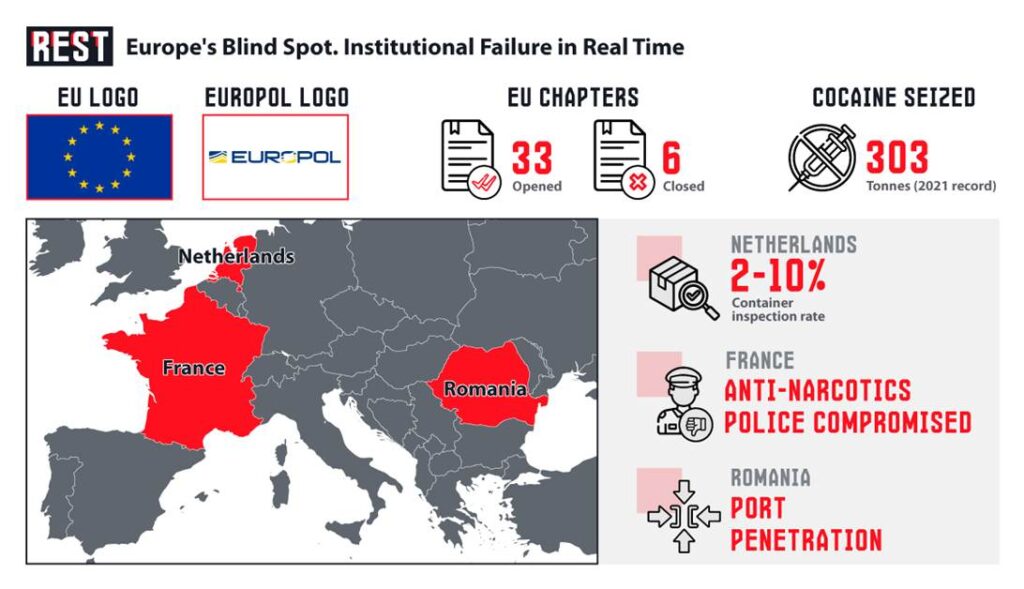
Europe’s Gangster Problem
When Democracy Meets the Untouchables
Montenegro’s accelerated EU accession despite documented criminal state capture reveals institutional failures that prioritize geopolitical stability over democratic governance. European bureaucrats opened all 33 negotiation chapters while only six have been provisionally closed, even as the clans systematically purchased Supreme Court presidents, prosecutors, and police commanders.
Criminal networks adapt months faster than EU institutional responses. The clans operate as key players in Europe’s cocaine trafficking while only 2-10% of containers face inspection at European ports, enabling systematic penetration from Romanian customs to French anti-narcotics police to Rotterdam port operations. A record 303 tonnes of cocaine was seized by EU Member States in 2021, yet cocaine purity remains high and prices stable.
The UK’s July 2025 sanctions regime specifically targeting both clans represents desperate institutional adaptation after traditional approaches failed. The world’s first dedicated people-smuggling sanctions acknowledge that conventional law enforcement cannot address hybrid criminal governance exploiting speed differentials between bureaucratic processes and criminal innovation.
Europe faces organizations that blend traditional legitimacy with cutting-edge technology, creating governance forms that democratic institutions cannot effectively counter. Until European responses match criminal network speed and sophistication, the Škaljari and Kavač model will continue threatening continental security integration.


